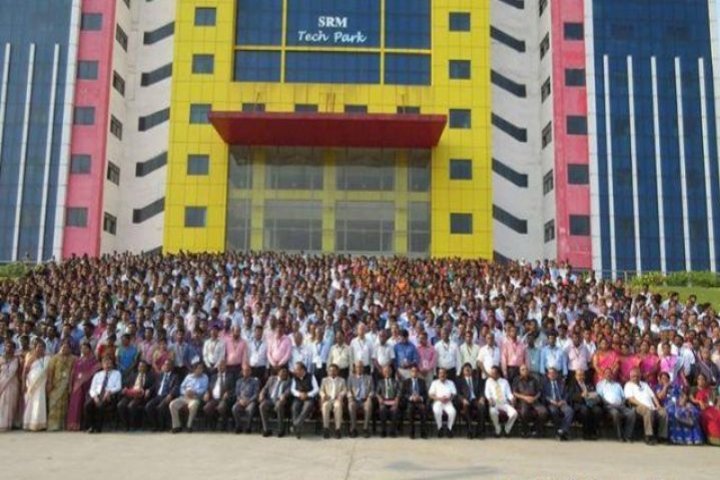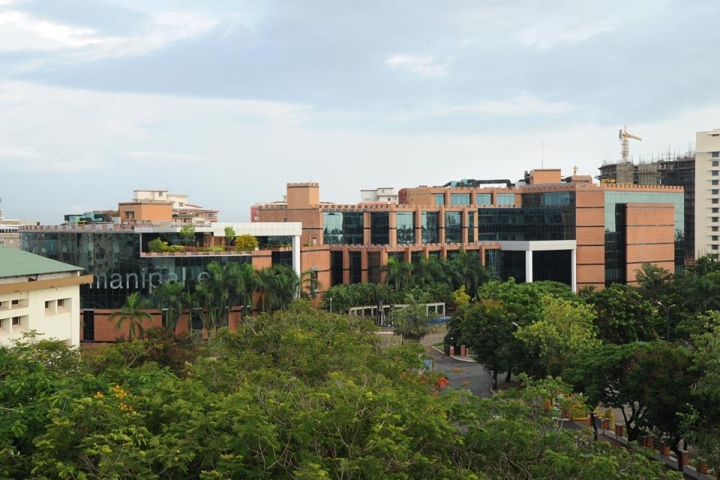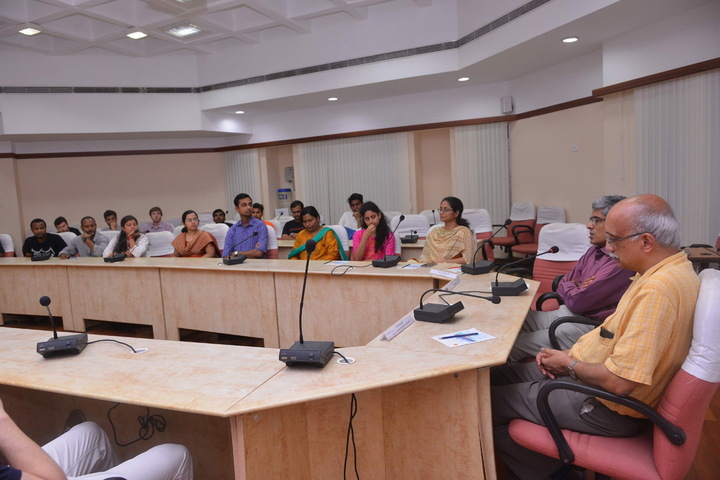
Biotechnology Engineering Course Details - Fees, Subjects, Syllabus, Duration, Eligibility, Career Scope
Degrees offered: B.E /B.Tech, M.E /M.Tech., Ph.D, B.Tech M.Tech, M.S
What is Biotechnology Engineering
Biotechnology engineering is a combination of biology and technology. It is the engineering discipline that is concerned with the study of biological systems, often manipulating them for better efficiency and understanding. Biotechnology covers the areas concerning the engineering of living systems like plant technology, biomedical technology, pharmaceuticals, drug design, forensics, genetic engineering, biochemical engineering, molecular biology, and bioinformatics to name a few.
A student needs to complete their 10+2 in the Science stream to get admitted to a UG course in Biotechnology Engineering. Similarly, a student needs a bachelor's degree in any relevant field with a minimum score specified by the university to be qualified for a postgraduate degree in Biotechnology Engineering.
The top colleges that offer Biotechnology Engineering courses are IIT Madras, Vellore Institute of Technology, NITK and BITS Pilani. Students who opt for a course in Biotechnology Engineering get hired as Research Associate, Project Associate, Lab Technician, Scientist, Process Engineer and Biotechnologists at leading companies or research institutes.
Biotechnology Engineering Course Highlights
Particulars | Values |
Branch Name | Biotechnology Engineering |
Top Courses | |
Course Duration | UG: Four years PG: Two years |
Admission Process | UG: Entrance Exam PG: Entrance Exam |
Entrance Examination | UG: JEE Mains, CUET UG, GUJCET, UPCET, NEET PG: GATE, SEE, TANCET, GPAT |
Eligibility | UG: 10+2 with PCM and Entrance Exam PG: Bachelor's Degree in a relevant discipline |
Fee Structure | Rs. 15,000 to 11 lakhs |
Career Options | Research Associate, Project Associate, Lab Technician, Scientist Process Engineer, Biotechnologist, Biotechnology Engineer, Lecturers, Professors, Advisor/Consultants |
Salary Structure | Rs. 3 LPA to Rs. 10 LPA |
Top Recruiters | Ranbaxy, Dr Reddy’s Laboratories, AstraZeneca, Aurigene Discovery Technologies Limited, Aventis Pharmaceuticals |
Top Biotechnology Engineering Colleges in India
Biotechnology Engineering courses are provided by around 190 public and private universities and colleges. The fee for Biotechnology Engineering is typically dependent on the specific degree programme chosen by the student, as well as the type and location of the institution. Some of the top colleges in India offering Biotechnology Engineering are listed in the table below.
Name of the College | Fees |
Rs. 33,350 | |
Rs. 8.94 Lakhs | |
Rs. 45,850 | |
Rs. 6.92 Lakhs | |
Rs. 6.29 Lakhs | |
Rs. 20.09 Lakhs | |
Rs. 7.81 Lakhs | |
Rs. 5.62 Lakhs | |
Rs. 10.35 Lakhs | |
Rs. 11 Lakhs |
Top Private Biotechnology Engineering Colleges in India
Around 140 private universities and colleges in India offer Biotechnology Engineering courses. Admissions to these institutions are granted based on past academic performance and entrance examination scores. The table below lists some of the top private colleges in India that offer Biotechnology Engineering.
Name of the College | Fees |
Thapar University | Rs. 20.09 Lakhs |
Rs. 6.67 Lakhs | |
Kalasalingam Academy of Research and Education, Virudhunagar | Rs. 4.51 Lakhs |
Rs. 7.84 Lakhs | |
Rs. 18.45 Lakhs | |
Rs. 9.95 Lakhs | |
Rs. 8.67 Lakhs | |
Rs. 14.42 Lakhs | |
Rs. 13 Lakhs | |
Rs. 12.09 Lakhs | |
5.78 Lakhs |
Top Government Biotechnology Engineering Colleges in India
Around 50 government institutes offer Biotechnology Engineering courses in India. Admission to these institutes is based on either an entrance exam or direct admission based on merit score. Mentioned below are the top government colleges offering Biotechnology Engineering courses in India.
Name of the College | Fees |
Rs. 86,860 | |
Rs. 3.76 Lakhs | |
Rs. 1.89 Lakhs | |
Rs. 42,400 | |
Rs. 3.04 Lakhs | |
Rs. 5.79 Lakhs | |
Rs. 2.26 Lakhs | |
Rs. 91,880 | |
Rs. 1.15 Lakhs | |
Rs. 3.26 Lakhs |
Eligibility Criteria (UG & PG) of Biotechnology Engineering
Eligibility Criteria for UG Courses
Students wanting to apply for undergraduate admission to a Biotechnology Engineering course should check the eligibility criteria of the desired institute before applying for the same. Most colleges accept students based on similar criteria which is a combination of a student’s merit and performance in entrance exams.
- Candidates need to have completed their higher secondary education (10+2) from a recognised board.
- They should be from the science stream and should have subjects such as physics, mathematics, and chemistry, as their core subjects.
- To get into top biotechnology engineering colleges, one must have a minimum score of 75 per cent in class 12.
- Candidates are required to clear relevant entrance exams specified by the chosen institute.
- In order to be eligible for a diploma course in biotechnology engineering, one has to have a minimum of 55 per cent aggregate marks in class 10th.
Eligibility Criteria For PG Courses
The eligibility criteria for the course can be checked on the official website of the institute or the programme brochure. While some universities require students to take entrance tests, others accept them based just on their scores in their bachelor’s degree.
- Students must have completed their graduation in science (BE or B.Tech), or any other equivalent degree from a recognised board or university.
- Students must have a minimum score of 60 per cent marks or 6.0 (out of 10.0) Grade Point Average (GPA) in the disciplines of biotechnology engineering.
- Candidates are required to clear relevant entrance exams specified by the chosen institute.
Biotechnology Engineering UG Entrance Examinations
Different types of entrance examinations help candidates secure their seats in biotechnology engineering institutes across India. Mentioned below are some of the entrance exams for admission into UG Biotechnology courses.
Exam Name | Exam Level | Conducting Body | Exam Schedule |
National | NTA | ||
National | IITs |
Biotechnology Engineering PG Entrance Exams
For admission to PG Biotechnology Engineering courses, universities require students to take entrance exams. Some of the entrance exams are mentioned in the table below:
Exam Name | Exam Level | Conducting Body | Exam Schedule |
National | IITs | ||
National | IITs |
College Predictors VIEW ALL
Scope of Biotechnology Engineering in India and Abroad
Biotechnology is one of the most emerging fields of study. It is often termed the next giant of the industry after IT In India. The pharmaceutical industry has already reached global prominence and is ever-growing. The sector constantly recruits skilled professionals. In India, research is majorly undertaken by public-funded institutions and there is a wide scope of jobs in the plethora of BT institutions.
Some other emerging fields include food technology and healthcare technology where modern companies and labs have emerged in India. Bioinformatics and computational biology also offer attractive opportunities that are desk-based jobs and require high analytical thinking. Students completing a degree in Biotechnology Engineering, get to work as Research Associates, Project Associates, Lab Technicians, Scientist Process Engineers, and Biotechnologists at leading companies.
Course Fees Biotechnology Engineering
| Minimum Fees | Maximum Fees | |||
|---|---|---|---|---|
| Private | Government | Private | Government | |
| UG | ||||
| PG | ||||
| DOCTORAL | ||||
| DIPLOMA | ||||
Course Subjects
The subjects included in the course curriculum of UG degrees in Biotechnology Engineering are Genetic Engineering, Cell Biology, Enzyme Technology, and Plant Tissue Culture. In the table below we have mentioned the syllabus of BTech degree in Biotechnology Engineering offered by UPES.
Semester 1 | |
Chemistry | Physics |
Mathematics I | Introduction to Biotechnology |
Introduction to IT systems for Health Sciences | Living Conversations |
Environment Sustainability & Climate Change | - |
Semester 2 | |
Mathematics II | Basic Electrical and Electronics Engineering |
Workshop Practices | Engineering Graphics |
Engineering Thermodynamics | Biostatistics |
Biochemistry | Social Internship |
Critical Thinking and Writing | Environment Sustainability & Climate Change (Living Lab) |
Technologies of the Future | - |
Semester 3 | |
Cell Biology | Microbiology & Microbial Technology |
Molecular Biology and Genetics | Exploratory 1 |
Design Thinking | - |
Semester 4 | |
Immunology & Immunotechniques | Bioprocess Engineering |
Heat and Mass transfer | Bioinformatics & Computational Biology |
Biophysics | Exploratory 2 |
Working With Data | EDGE-Soft-Skills |
Government/NGO/Startup Internship | - |
Semester 5 | |
Genetic Engineering & Genomics | System Biology |
Downstream Processing | Bioanalytical Techniques |
Project I | Exploratory 3 |
EDGE – Advance Communication | Leadership & Teamwork |
Semester 6 | |
Molecular & Nano Diagnostics | Data analysis and simulations |
Environmental Biotechnology | Enzyme Technology |
Program Elective - I | Big Data Analytics |
Genome Editing | Biosimilars (Discovery, Development and Technology) |
Plant Physiology | Project II |
Exploratory 4 | EDGE – Advance Communication II |
Start your Start Up | Summer Industrial Internship |
Semester 7 | |
Animal and Plant Biotechnology | Proteomics & Protein Engineering |
Program Elective - II | Stem-Cell technology |
Waste management and Upcycle | Machine Learning |
Fundamentals of Plant Pathology and Disease Management | Program Elective - III |
Rational Drug Discovery | Gene Expression and Transgenic |
Cancer Biology | Project III |
Plant Tissue Culture | Exploratory 5 |
Summer Internship Presentation | - |
Semester 8 | |
Ethics, Regulations and IPR | GMP and GLP |
Program Elective - IV | NanoBiotechnology |
Precision Medicine & Wellness | Tissue Engineering |
Plant Proteomics and Genomics | Project IV |
Seminar presentation | Exploratory 6 |
Careers in Biotechnology Engineering
The biotechnology industry is an upcoming and dynamic sector in India. Many emerging sectors of employment are exclusive to biotechnology engineering. India is one of the largest pharmaceutical-producing countries in the world and hence, is the biggest source of employment in the BT industry. Besides, there are other industries too which offer jobs after BT courses.
Some other industries where students can work are academic and institutional research, the pharmaceuticals and drug industry, the chemical industry, clinical sectors involving research, and FMCG.
Job Profile | Description |
The role of Research Associate (RA) demands work on short research assignments related to biotechnology engineering. They are responsible for collating and analyses complex data. | |
It is a skilled job and requires well-trained and knowledgeable people to smoothly run the company’s operations. All of these are complex tools and require sound knowledge and skills to be able to handle the job smoothly. | |
The role of a scientist requires one to work on research projects that provide outputs that can be further taken up by industries and collaborators. They also collaborate with other researchers and academia to develop new techniques and products. | |
Consultant | Technical consultants resolve log errors and analyse and improve the performance of features including web-based portals. The role involves providing technical and expert advice for solving major problems. |
Upcoming trends
Many recent developments and discoveries have shaped the human understanding of basic things as simple as understanding the human sleep cycle or protein shape. With modern technology and computer-aided processing capacities, biotechnology is at the forefront of unveiling the most astounding discoveries of life.
The next-generation sequencing (NGS) technology was a breakthrough in understanding the basic building blocks of all life forms, followed by it, the window opened to the plethora of computational biology fields that take us into the future. Genomic and proteomic technologies that form a part of the biotechnology engineering courses are the way forward.
Genetic engineering methods like CRISPR technology are a few modern areas in Biotechnology that require a lot of human resources and promise a bright future for the upcoming generation. Hence, not only from the scientific research and development point of view but also in terms of employability, biotechnology engineering institutes are surely going to play a crucial role in shaping the country’s future.
Job Profiles and Top Recruiters
There are many areas where Biotechnology Engineering graduates can work such as the drug industry, chemical industry, clinical sectors involving research, and FMCG. Mentioned below are some of the top recruiters in the field of Biotechnology Engineering.
Top Recruiters:
- Department of Biotechnology
- Council for Scientific and Industrial Research
- Academic Institutions: NITs/IITs/Central universities
- Ranbaxy
- Dr Reddy’s Laboratories
- AstraZeneca.
- Aurigene Discovery Technologies Limited
- Aventis Pharmaceuticals.
- Avesthagen Technologies Pvt Ltd
- Bharath Biotechnology
Average Salary
The average salary after a Biotechnology Engineering course depends on many factors such as the job profile, experience and skills of the candidate, and location of the company. Below is a table showing the average salary per annum offered in different job roles in the field of Biotechnology Engineering:
Job Profile | Average Salary |
Biotechnology Engineer | Rs. 3.0 Lakhs |
Research Associate | Rs. 4.6 Lakhs |
Project Associate | Rs. 10.1 Lakhs |
Lab Technician | Rs. 2.8 Lakhs |
Scientist Process Engineer | Rs. 12.3 Lakhs |
Source: AmbitionBox
Required Skillset for Biotechnology Engineering
There are certain skills that the students must possess to do well in their Biotechnology Engineering careers. Mentioned below are some of the most important skills:
- Patience
- Organisational skill
- Detail-oriented
- Problem-solving
- Time management
- Project management
Course Curriculum for Biotechnology Engineering
The course curriculum of Biotechnology Engineering is an amalgamation of basic biological science concepts and rigorous engineering. A typical biotechnology engineering UG programme has the following key concepts covered in the entire course of study.
- Basic science courses: Physics, Mathematics, Biology, Chemistry
- Basic engineering courses: thermodynamics, materials science
- Introduction to Process Engineering
- Energy balance
- Genetic engineering
- Drug design
- Chemical biology
- Environmental science and engineering
- Computational biology
- Clinical engineering
The curriculum for postgraduate biotechnology mostly consists of advanced-level subjects and topics providing in-depth knowledge in various aspects of biotechnology engineering. The curriculum, however, can vary slightly from college to college.
Popular Biotechnology Engineering Entrance Exams in India
JEE Main
Declaration of Result: 17 Apr, 2025
NEET
Exam Date: 04 May, 2025
JEE Advanced
Application Process: 23 Apr, 2025 - 02 May, 2025
COMEDK UGET
Exam Date: 10 May, 2025
Popular Biotechnology Engineering Colleges in India VIEW ALL
VIT Vellore
- Fees: ₹ 692000
- Exams: VITEEE
RVCE Bangalore
- Fees: ₹ 386296
- Exams: COMEDK UGET , KCET
Frequently Asked Questions (FAQs)
Question: What is the duration of undergraduate and postgraduate courses in the field of Biotechnology Engineering?
Answer :
UG courses are generally of three to four years duration, whereas PG courses are of two years.
Question: Which are the famous institutions providing Biotechnology Engineering courses in India?
Answer :
Top engineering institutes in India providing specialisation in Biotechnology Engineering are IIT Madras, VIT Vellore, NIT Rourkela, Thapar University, and BITS Pilani.
Question: What are some popular entrance exams in the field of Biotechnology Engineering?
Answer :
Many exams are there that can provide admission to Biotechnology Engineering courses such as JEE Main, JEE Advanced, IIT JAM, and GATE.
Question: What are the career options available in the field of Biotechnology Engineering?
Answer :
The career choices available in the field of Biotechnology Engineering are endless. Some of the popular ones are Technician, Scientist, Academician, and Consultant.
Question: Who is eligible for a Biotechnology Engineering course?
Answer :
Generally, for an undergraduate course, the candidates need to clear the 10+2 in PCM with a valid score. For a postgraduate course, candidates are required to have a Bachelor's degree in Biotechnology Engineering or a related discipline.
























